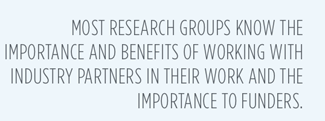Ron Kehrig
 Starting and operating a small company is not easy, and it is hard to survive. It often seems like far too many skill sets need to be found among very few bodies within the company. At times it may feel like you are alone – on “Company X” island.
Starting and operating a small company is not easy, and it is hard to survive. It often seems like far too many skill sets need to be found among very few bodies within the company. At times it may feel like you are alone – on “Company X” island.
Fortunately, outside resources are available, but like most things, there is usually a cost. Sometimes that ‘outside resource’ is recognized as needed in solving issues relating to time, operational capacity or expertise. Unfortunately, management’s challenge often is in paying for what is needed. As a result, a lot of direct management time and energy is spent learning and accessing the latest funding program.
Research and funding programs are important to the development and survival of many small to medium companies, and many institutions and university researchers also rely on these support mechanisms along with interaction with small companies (and large) to bring a commercial relevance to their programs or gain access to competitive research dollars. There is a definite synergy with the right partners, and a little bit of money may go farther than you think.
In many ways you are not alone, and these resource suppliers could be convinced to be willing allies to get additional resources working for you with the right project. These experts are often quite adept in leveraging funding for research and may even help draft proposals or assist in project design and completion. In short, they may have the added capacity or expertise you need. Researchers may also be able to access funds not accessible to you directly through the Natural Sciences and Engineering Research Council of Canada (NSERC, www.nserc-crsng.gc.ca) or other programs you may not even be aware of.
Getting to know the hard and soft infrastructure in your area (both your geographic area and that relating to your product areas) can pay dividends. Public infrastructure as well as private (or quasi-private/cost recovery) resources may exist that you were not fully aware of. There may be someone with expertise, specialized or available equipment or something else you uncover once you start looking. It is sometimes hard to list all the capabilities and options on a website, and that rarely replaces having a discussion directly with someone in the organization.
 Don’t be afraid to pick-up the phone or arrange a meeting with a researcher to discuss your technical challenges. It is a good idea to spend some time in discussions with the subject matter experts and ask them about the things you need like toll-processing, pilot-plant facilities or packaging facilities available in your area. It is seldom too early or too late to begin this process. You may be at the stage of assessing a new opportunity or need to solve a processing or packaging problem or simply a have a question like ‘What can I do with my byproducts?’ Most researchers are very open to meaningful discussions on your technical issues, but be mindful of their time and your own, and stay focused.
Don’t be afraid to pick-up the phone or arrange a meeting with a researcher to discuss your technical challenges. It is a good idea to spend some time in discussions with the subject matter experts and ask them about the things you need like toll-processing, pilot-plant facilities or packaging facilities available in your area. It is seldom too early or too late to begin this process. You may be at the stage of assessing a new opportunity or need to solve a processing or packaging problem or simply a have a question like ‘What can I do with my byproducts?’ Most researchers are very open to meaningful discussions on your technical issues, but be mindful of their time and your own, and stay focused.
In Saskatchewan for instance, many small companies have benefited from collaborations with all kinds of expertise and facilities in the area from analytical or processing work to basic research. The Saskatchewan Food Centre (www.foodcentre.sk.ca) is an active partner in product development and early stage processing for many food categories from snacks, soups and sauces to extruded products and drinks. Similar types of centres exist across Canada, specializing in food and bio-product processing and commercialization to cater to the needs of small, medium and large enterprises. Other facilities, such POS BioSciences Corp. (www.pos.ca, Saskatoon, SK) also can do ‘toll-processing’ for larger scale processing and extraction, and for clients processing market volumes prior to constructing a dedicated facility. Organizations like these can also often be tapped into for technical guidance and support.
Most research groups know the importance and benefits of working with industry partners in their work and the importance to funders. Academic institutions often have several Research Chairs funded by provincial-federal governments or industry, faculty or extension personnel who are strongly encouraged to work with industry and are always open for collaboration – it may not cost as much as you think. Leveraged funds may even be available to the research team working on your issues for in-kind participation or materials, etc.
Universities and research organizations also usually have a business liaison or technology office, which – in addition to managing intellectual property or research agreements – can help you sort out which researcher would be most appropriate to meet with. Even if you don’t end up owning intellectual property coming out of the research, early involvement in the research may give you an option for a license to it or first-right of refusal to commercialize it.
Some provinces have specialists to guide you or industry associations with technical help or path-finding services. While public infrastructure and universities are a good place to start, don’t assume private facilities or persons are off limits either – sometimes it may be that your contact is just what another company or person has been looking for, but just didn’t know you existed or would collaborate.
The investment in time to contact others and get them working with you to leverage available funding may be a better use of time than holding up in a room writing your own direct proposals for funding.
Entrepreneurs sometimes fear that by asking for help, they will be seen as a corporate or personal deficiency by funds or financial organizations. Quite the opposite is true. Recognizing your company’s capacity and managing relationships to get the job done with and through the capabilities of others is more often seen as talent or strength, and that’s one reason many comment that they “invest in people and not the specific business.”
It can be a complex and a daunting task to sort out where to start, but sometimes the best thing to do is dive into building your network and contacts rather than being an island.
Who knows – if you are really successful, maybe you can live on or buy an island when you retire!
Saskatchewan Ministry of the Economy,
206-15 Innovation Boulevard, Saskatoon, SK, S7N 2X8
Email correspondance:
Ron.Kehrig@gov.sk.ca
 Canadian Food Business
Canadian Food Business
